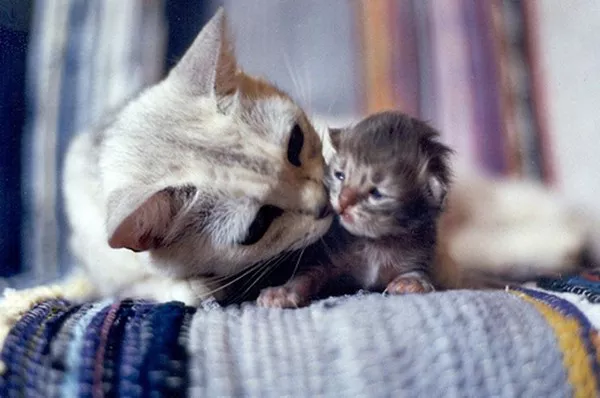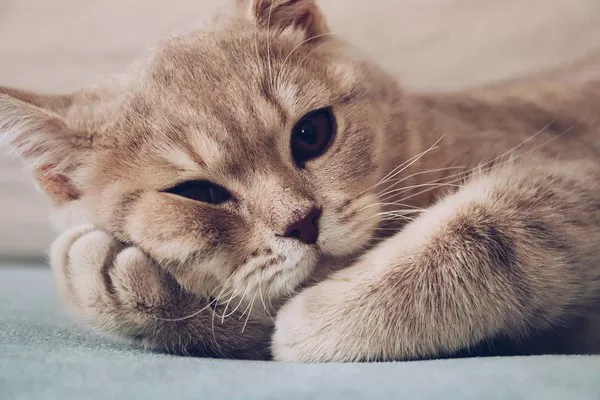If you’ve recently welcomed a 2 week old kitten into your home, you’re likely wondering what to expect from your new furry friend. At this age, kittens are still very young and fragile, so it’s important to know what to look out for to ensure that they stay healthy and happy. In this article, we’ll cover some of the key things you can expect from a 2-week-old kitten, including their physical development, behavior, and care needs.
Physical Development
At 2 weeks old, kittens are still very small and relatively helpless. They will weigh only a few ounces and will be about 4 inches long. Their eyes are usually still closed, but they will start to open at around 10 days old. When their eyes first open, they will be blue in color, but this will change over the coming weeks.
Kittens at this age are still reliant on their mother for nourishment, and will continue to nurse frequently throughout the day and night. Their teeth will start to come in at around 2-3 weeks old, which may cause some discomfort and lead them to chew on things to alleviate it. Be sure to provide your kitten with soft items to chew on, such as a cloth or soft toy.
Behavior
At 2 weeks old, kittens will spend most of their time sleeping and nursing. They will not yet be very active or playful, although you may notice them starting to move around more and explore their surroundings as they get older. It’s important to provide a safe and secure space for your kitten to rest and sleep, away from any potential hazards.
As your kitten grows and becomes more mobile, you may notice them starting to exhibit playful behaviors such as pouncing and batting at objects. While it’s important to encourage your kitten’s natural curiosity and playfulness, make sure to provide them with plenty of soft toys and avoid any toys that are small enough to be swallowed.
Care Needs
At 2 weeks old, your kitten will still be completely reliant on their mother for nourishment and care. However, it’s important to start thinking about their care needs as they grow older. Make sure to provide your kitten with a clean and warm space to sleep, and monitor their health closely for any signs of illness.
It’s important to handle your kitten gently and with care, as they are still very fragile at this age. Avoid picking them up by the scruff of the neck, and make sure to support their head and body at all times. You can start to introduce your kitten to gentle grooming, such as brushing or wiping their eyes, but be sure to use gentle and non-irritating materials.
In terms of feeding, make sure to continue to provide your kitten with their mother’s milk or a kitten-specific milk replacement formula. As they get older, you can start to introduce them to solid foods, but be sure to do so gradually and under the guidance of a veterinarian.
Feeding
At two weeks old, kittens should still be nursing from their mother. If the kitten has been separated from their mother, you will need to feed them using a bottle and kitten milk replacer. It’s important to feed them every two to three hours around the clock, as they require frequent feedings to grow and develop properly.
If the kitten is not nursing or taking the bottle, you should contact a veterinarian immediately, as they may be dehydrated or have a medical condition that requires treatment.
Socialization
Socialization is important for kittens, as it helps them learn how to interact with people and other animals. At two weeks old, kittens are not yet able to play or socialize with others. They rely on their mother for warmth, comfort, and security.
As the kitten grows, you can start to introduce them to new people and environments. This will help them become more confident and comfortable with their surroundings. You can also start to introduce them to toys and other objects to help stimulate their senses and encourage play.
Health Care
At two weeks old, kittens are still developing and are more susceptible to illness and disease. It’s important to monitor their health closely and watch for any signs of illness, such as diarrhea, vomiting, or lethargy.
You should also schedule an appointment with a veterinarian to have the kitten examined and vaccinated. The vet can also provide advice on proper nutrition and care for the kitten.
In conclusion, 2-week-old kittens are still very young and fragile, and require special care and attention to ensure that they stay healthy and happy. Be sure to provide a safe and warm space for your kitten to sleep and grow, and monitor their health closely for any signs of illness. With proper care and attention, your new furry friend will thrive and grow into a healthy and happy adult cat.
Recommended reading:

























